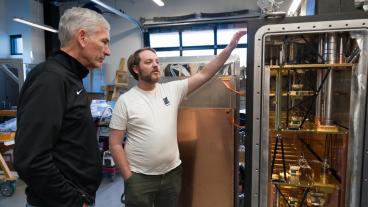CO School of Mines-affiliated startup GTO Technologies closes initial seed funding round
Grantham Foundation for the Protection of the Environment is key funder

Geothermal energy startup GTO Technologies, founded by Colorado School of Mines faculty, has closed an initial seed funding round, securing $1.7 million towards its goal of raising $5 million. To raise the funds, the startup worked with Mines’ Corporate and Foundation Relations Office, the Office of Research and Technology Transfer, and the Global Energy Future Initiative.
GTO Technologies is developing a second-generation Enhanced Geothermal System (EGS) Technology which allows for both the construction and control of massive subsurface heat exchangers for zero-carbon electricity generation and direct heat applications which decarbonize power generation and district heating.
To date, every EGS has failed economically due to non-symmetrical fluid flow down a small subset of fractures in the heat exchanger, causing the heat exchanger to short circuit, resulting in premature thermal decline, reduced power plant efficiency and severe economic impacts.
“What differentiates GTO Technologies from all other systems on the market is our ability to overcome the natural tendency for short circuiting, and to control the conformance from the injectors into the producers, improving EGS power generation,” said William W. Fleckenstein, founder of GTO Technologies and Mines’ director of strategic business development in the Office of Global Initiatives and Business Development.
With this initial seed funding, GTO Technologies will complete the development and testing of second-generation downhole tools. These are specialized instruments and equipment used to drill and perform well interventions. The funding will also be used to prepare for commercial deployment.
The biggest investor so far in GTO Technologies is the Grantham Foundation for the Protection of the Environment. “The actions needed to prevent catastrophic (climate) change will be impossible without widespread public support,” the foundation writes on its website. “Communicating the risks from climate change and environmental degradation, and the urgency of counteracting those risks, is our top priority.”




